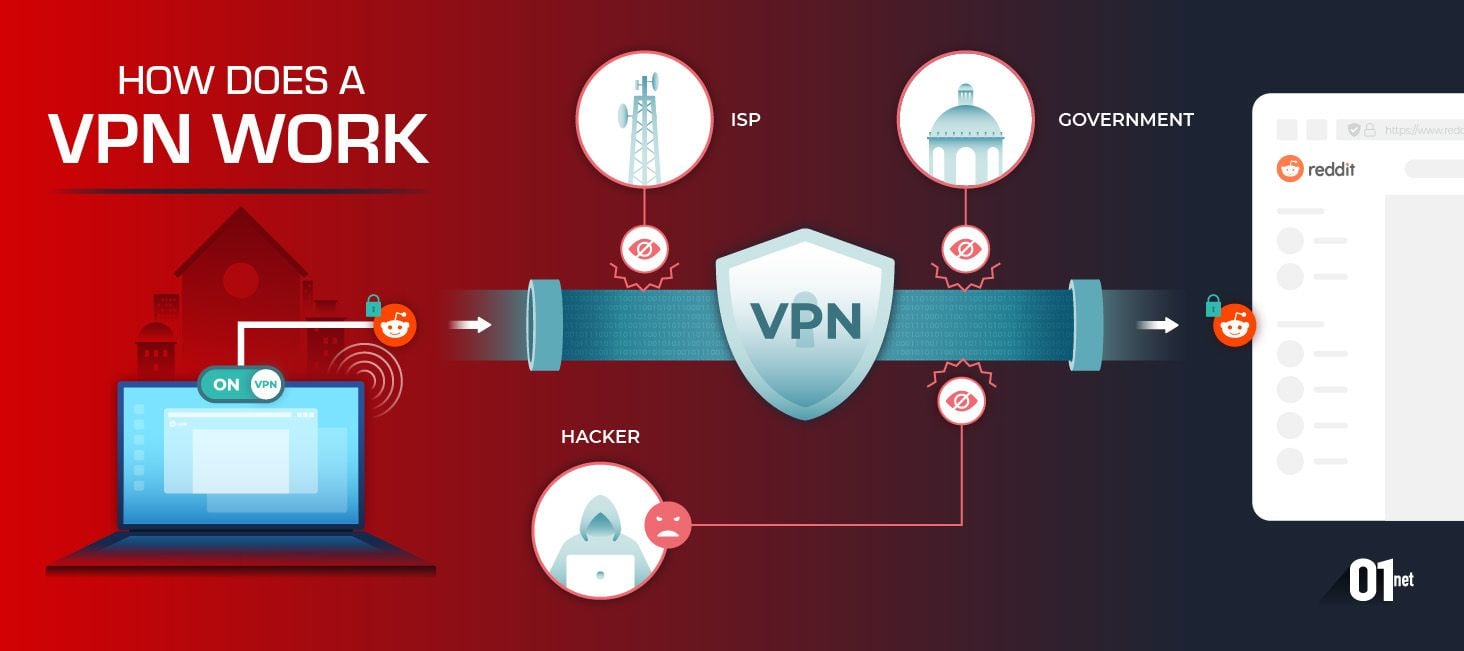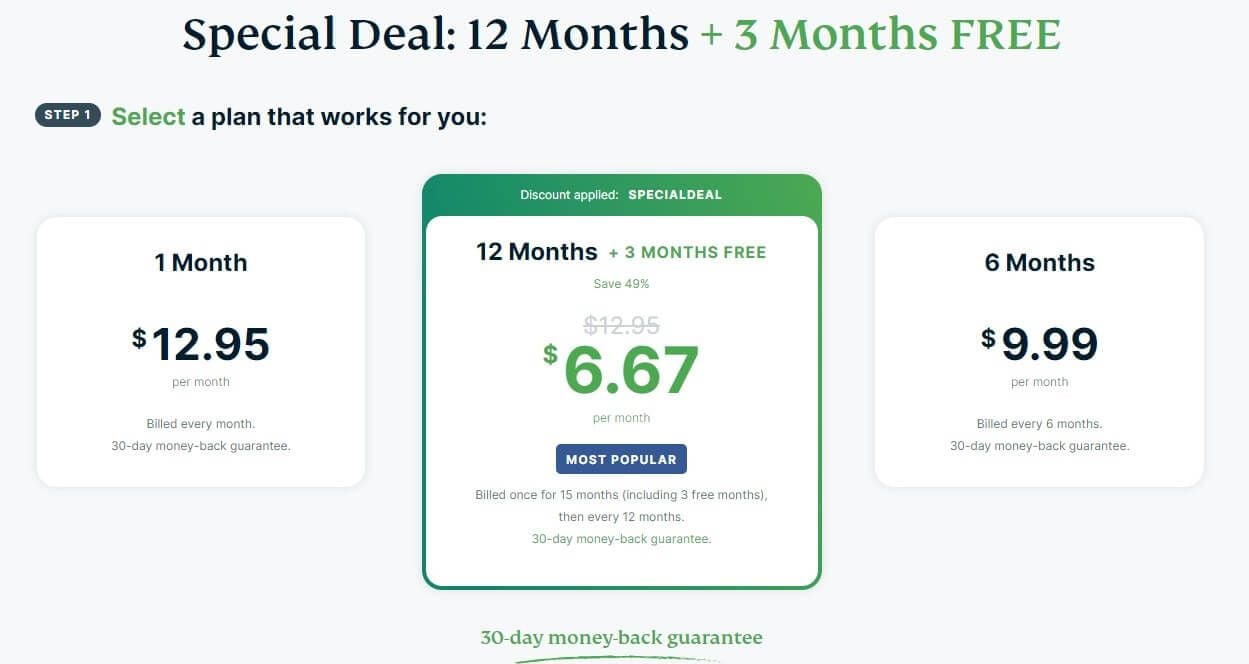Does your heart miss a beat at the thought of other people taking a look at your browsing history? If you’re like many people, it probably does. And no, you don’t need to be a creepy person to desire to keep your online activities private. You’re not just worried about your nosey roommate — what if your ISP is snooping in too? So you may have considered the options: Is private browsing private enough? Will a VPN hide search history from my internet service provider? Should I wipe my hard drive and throw it in the trash can?
This article will dive into the intricacies of VPN technology and explore whether it can truly shield our browsing and search history from ISPs.
How VPNs Work
A Virtual Private Network is a tool that provides a secure and private connection over the Internet. It does so by encrypting your data and masking your IP address.
Here’s what happens when you connect directly to the Internet without a VPN. Your computer or smartphone sends requests for web pages or downloads to the server hosting the content you’re accessing.
This traffic typically travels through your Internet Service Provider (ISP). It acts as an intermediary between your device and the Internet. As you can imagine, your online activities and data are exposed to your ISP — and potentially other entities.
But you don’t want this, so you hop on a VPN to hide your search history.
When you connect, your internet traffic routes through an encrypted tunnel between your device and the VPN server.
Encryption plays a vital role here. Your VPN typically uses advanced encryption algorithms to scramble your online activities and data, making them indecipherable.
What’s more, all your online traffic passes within the VPN’s secure tunnel. That includes the websites visited, downloads, uploads, and app usage.

ISPs and How They Track Online Activity
ISPs are not the bad guy, but don’t repeat that in public. They play a crucial role in connecting you to the Internet by establishing and maintaining the physical infrastructure necessary for connectivity.
However, they can track and monitor your online activities. And they will use that ability as long as you let them.
They can monitor the websites you visit, the apps you use, how long you’re online, and even how much data you consume. This collection occurs as part of the normal operation of providing Internet services and managing network resources.
When you visit a website, your device requests the ISP’s DNS server to translate the domain name into an IP address. While this happens, your provider can log the domain names you access and basically take a snapshot of your browsing history.
They can also analyze the content and metadata of the data packets flowing between your device and the Internet. Through deep packet inspection (DPI), your ISP can examine the protocols, ports, and even the actual contents of your online communications. It provides them with a ton of information about your traffic and online habits.
Don’t forget cookies, which help your ISP associate your online activities across different websites and services, creating a comprehensive profile of your browsing habits.
It’s all perfectly legal. Some countries even require your provider to retain that data and hand it over if authorities decide they need it.
Can VPN Hide History from ISPs?
Yes, a VPN can effectively hide your browsing history from your ISP.
As mentioned earlier, a VPN encrypts your Internet traffic and routes it through a secure tunnel to a remote server. This blocks your provider from directly monitoring or accessing your browsing history.
What’s more, the encryption renders your data unreadable to your ISP or any other actor trying to look in.
In addition, the VPN camouflages your IP address and replaces it with one associated with the server you’re connected to. This adds an extra layer of anonymity, making it difficult for ISPs to trace your online activities to your device.
But there’s a caveat you must take note of. While VPNs can effectively hide your search and browsing history, they have limitations.
A VPN primarily protects your traffic while it moves between your device and the server. But it’s no longer encrypted once it exits that server and reaches its destination.
What does this mean? If you visit websites that do not use HTTPS encryption, your browsing activity on those sites may still be visible to your ISP.
In addition, because you’re using an unfamiliar IP address, your ISP recognizes that you’re using a VPN. Thankfully, it cannot see anything else, including viewed content, your downloads, and browsing habits.
What About Google and Other Search Engines?
Search engines like Google collect and analyze vast amounts of data to deliver relevant search results and improve their services. And to push personalized ads to you, of course.
So, does using a VPN keep Google’s prying eyes away? Yes, VPNs hide history from Google and other search engines. Masking your IP address keeps them from linking your searches directly to your location. This limits geolocation-based targeting and the personalization of search results.
But wait a minute — you’re not entirely home-free. Search engines, like Google, use various tracking techniques beyond just IP address analysis. Cookies, browser fingerprinting, and account information help them gather data about your search history, interests, and preferences.
So, if you are signed into your Google account while using a VPN, it can still see your browsing history. And Google will associate your search queries and online activities with your account.
How to Hide Search and Browsing History With a VPN
Here’s how to use a VPN to hide your browsing history from your Internet service provider (ISP).
- Choose a reliable VPN provider that aligns with your privacy needs. ExpressVPN is an excellent choice.
- Sign up for an account on the provider’s website and select a suitable subscription plan.
-

© ExpressVPN
-
- Download and install the Virtual Private Network software or app onto your device. You can download it directly from the site or an app store. ExpressVPN is one of the best VPNs for iPhone, Windows, MacOS, Linux and Chromebook.
- Launch the application and log in using your account credentials.
- Choose a server location from the available options. For best performance results, select a server closer to your location.
- Click the Connect button to establish a secure connection to the VPN server.
- Verify the VPN connection by checking your IP address and testing your browsing activities.
- Keep the VPN app running and connected whenever you want to hide your browsing history.
How to Pick the Right VPN
Loads of options are available for hiding search history from ISPs, so selecting the right one can be daunting. What you choose comes down to your preferences. That said, these are some factors to help you make an informed decision:
Security and Privacy Features
This is the top priority for most users. Look for a service with robust encryption protocols like OpenVPN or WireGuard.
It must have a strict no-logs policy, meaning it doesn’t retain any records of your online activities. An independent audit is the best way to verify this, so look out for providers that have done that. Other features like advanced encryption, kill switch, DNS leak protection, and split tunneling provide the layers of protection you need.
Server Network and Locations
Check the VPN’s server network and the geographic locations they cover. A wider server network provides more options and better performance. The number of sites also matters as you’re more likely to have servers close to you if your Virtual Private Network is in many countries. Look for servers in the locations you frequently access or where you need to unblock geo-restricted content.
Free from Leaks
Your VPN’s excellent security tools are useless if it is liable to leak your data. When that happens, your ISP can see your history and activities. A reliable service should have built-in measures to prevent IP, DNS, and WebRTC leaks. Look for a VPN that has been independently tested for leaks and assures leak-free operation.
Speed and Performance
Connection speeds and latency are important, especially if you engage in high-bandwidth activities like streaming or gaming. Read user reviews and performance tests for insights into the VPN’s speed and reliability.
Pricing and Payment Options
Examine VPN pricing plans and determine whether they fit your budget. Some providers offer free versions or money-back guarantees, allowing you to test their service before committing. But cheaper isn’t always better. A provider may be worth it, even if you have to throw in an extra buck or two. Evaluate the available payment options, including cryptocurrency, for added anonymity.
Customer Support
Support is essential when you’re in over your head or need answers. Look for VPN providers that offer reliable customer support, including live chat, email, or ticket-based systems.
The 3 best VPNs for effectively hiding your search history from Internet Providers :
3000 servers
105 covered countries
30 days money-back guarantee
8 simultaneous connections
9.4 /10
12000 servers
100 covered countries
45 days money-back guarantee
7 simultaneous connections
9.2 /10
7492 servers
118 covered countries
30 days money-back guarantee
10 simultaneous connections
9.8 /10
Should You Use a Free VPN?
Using a free VPN to hide history from your Internet service provider may seem appealing. But, besides money leaving your pocket, you should consider the implications of this.
For one, free VPN providers need to generate money to sustain their operations somehow. Since you’re not paying, you’re often the product. Some free VPNs will collect and sell your browsing history, online activities, and personal information to third parties. It’s wasted effort on your end.
Free services might lack the security measures provided by paid alternatives, offer small server networks, and provide minimal or no customer support. And high demand on limited resources usually leads to buffering, lagging, and poor performance.
So, while free VPNs can be tempting, weighing their potential risks and limitations is crucial. Instead, leverage the discounts and money-back guarantees on premium services like ExpressVPN.
Other Ways You Can Hide Your Browsing History
By now, you’ve seen how effectively a VPN hides your browsing history and its limitations. If you’re interested, there are other steps you can take to layer your privacy.
- Tor Browser: The Onion Router (Tor) network routes your internet traffic through a series of volunteer-operated nodes, encrypting your data and making it difficult to trace. Its proprietary web browser shares the same name. It can protect your browsing history by anonymizing your online activities and preventing tracking.
- Privacy-Focused Browsers and Search Engines: They prioritize user privacy and limit user tracking. Examples include DuckDuckGo and Startpage. These Google options do not store your search history or personalize search results based on your previous activities.
- Change your DNS Settings: By default, your ISP provides DNS servers that your device uses to resolve domain names. However, you can change these DNS settings to alternative providers, such as Google Public DNS, Cloudflare DNS, or OpenDNS.
Does VPN Hide Search History? Final Thoughts
Your browsing history presents a snapshot of your online activities and interests. We don’t blame you for wanting to keep that private, even from your ISP.
Does VPN hide history from your Internet service provider? Yes, it does — but only to an extent.
It’s up to you to take the necessary steps to safeguard your data. For instance, consider switching to a different browser than the one your Google account is logged into for sensitive activities. Most importantly, opt for a reliable VPN provider.